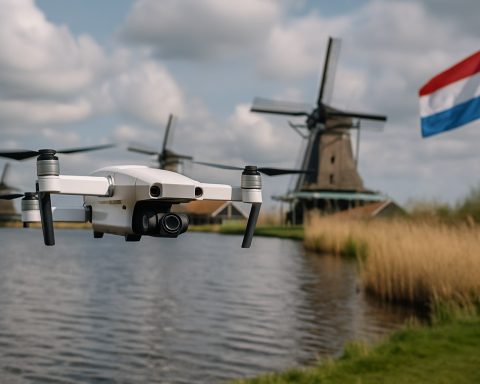Microsoft, a cornerstone of the Nasdaq, is strategically positioning itself at the forefront of emerging technologies. This isn’t just about riding the wave of past successes; instead, the tech giant is pioneering innovations in quantum computing, artificial intelligence, and cloud solutions.
Quantum Leap: The Future of Computing
While traditional computing platforms are still Microsoft’s bread and butter, the company has been making substantial investments in quantum computing. This technology promises to revolutionize data processing capabilities, making seemingly insurmountable problems solvable almost instantaneously. By 2025, Microsoft aspires to integrate these capabilities into its cloud services, potentially making quantum resources accessible for businesses globally.
AI Integration: Beyond Surface Level
Artificial Intelligence isn’t new to Microsoft, but its application of AI is becoming more nuanced and pervasive. The company’s AI-powered Copilot in Microsoft 365 is setting a competitive standard for how productivity tools leverage machine learning for enhanced user experience. This feature is designed to provide context-aware suggestions, streamline workflows, and ultimately increase productivity across its suite of office products.
Cloud Expansion: Azure’s Next Frontier
Azure continues to be a key growth driver for Microsoft. The focus is now on hybrid cloud environments, enabling seamless integrations with on-premises and multi-cloud systems. This approach prepares enterprises for a future where digital and physical infrastructures are inextricably linked.
As Microsoft continues to evolve, its influence on Nasdaq’s landscape is undeniable. By investing in these transformative technologies, it is setting a precedent for how tech giants can usher in a new era of digital innovation.
Quantum Leap, AI Integration, and Cloud Expansion: Microsoft’s Impact on the Future
Microsoft’s strategic investment in quantum computing, AI, and cloud services illustrates not just an evolution within the company itself, but also poses significant implications for the environment, humanity, and the global economy. As these technologies become increasingly intertwined with daily life, their potential to reshape society is profound.
Quantum Computing and Environmental Impact
The promise of quantum computing lies in its ability to solve complex problems at unprecedented speeds. This capability could lead to significant advances in environmental science, such as climate modeling and renewable energy optimization. By processing vast amounts of data faster and more efficiently, quantum computing can help scientists better understand climate patterns, predict changes, and develop innovative solutions for sustainability.
Moreover, quantum computing has the potential to reduce energy consumption in data centers. Traditional data centers require massive amounts of electricity, contributing to carbon emissions. Quantum computing, with its efficiency and speed, could drastically cut down on the energy required for complex computations, leading to greener tech infrastructures.
AI’s Influence on Humanity
The integration of AI into daily productivity tools, as seen with Microsoft’s AI-powered Copilot, signifies a significant shift in how humans interact with machines. This evolution in AI seeks to augment human capabilities, making tasks more efficient and freeing individuals from mundane and repetitive processes. As AI technology continues to develop, it will raise important ethical and societal questions about the nature of work and human engagement.
AI’s pervasive influence is also expected to democratize access to knowledge. As AI systems become more adept at language processing and understanding, they can provide more personalized and accessible education, healthcare, and professional advice, bridging gaps between populations of different socioeconomic backgrounds.
Economic Transformations Through Cloud Expansion
Microsoft’s emphasis on hybrid cloud environments reflects a broader trend of digital transformation in the business world. As companies adopt these technologies, economic structures are poised for change. The ability to seamlessly integrate different cloud platforms ensures that enterprises remain agile and competitive. This transformation equips businesses with the tools needed to innovate rapidly, scale effectively, and respond swiftly to market demands.
The expansion of cloud solutions like Azure creates vast opportunities for new business models and economic growth. However, it also requires a reevaluation of job skills and workforce preparedness. As cloud and AI technologies automate routine tasks, the demand for tech-savvy, innovative thinkers increases, necessitating a significant shift in education and training systems.
Connection to the Future of Humanity
The development and integration of these transformative technologies are setting the stage for a future where digital and physical realities are deeply interconnected. Quantum computing, AI, and cloud solutions collectively offer pathways to address some of humanity’s most pressing challenges, from climate change to global inequality.
As Microsoft and other tech giants lead the charge in this technological revolution, they not only redefine the boundaries of innovation but also shape the trajectory of human progress. The future of humanity, therefore, hinges on how responsibly these technologies are implemented, ensuring they serve the greater good and promote sustainability, equality, and economic vitality.
Microsoft’s Innovations: Unveiling the Future of Technology
Microsoft, a bedrock of the Nasdaq index, is not merely maintaining its legacy but is actively spearheading advances in technology that promise to reshape our digital world. From revolutionizing computing paradigms to reimagining artificial intelligence applications, Microsoft’s strategic initiatives are poised to set new industry standards.
Quantum Computing: A Game-Changer on the Horizon
Microsoft’s significant strides into quantum computing are set to transform the computing landscape. As traditional computing reaches its limits, quantum technology offers exponential data processing power. This evolution has profound implications for industries reliant on complex computations, such as pharmaceuticals, logistics, and climate modeling. By integrating quantum capabilities into its Azure cloud platform by 2025, Microsoft aims to democratize access to unprecedented computing power.
AI: Transforming Productivity Tools
Microsoft’s commitment to artificial intelligence extends beyond conventional uses; its AI-driven Copilot feature in Microsoft 365 demonstrates the company’s innovative approach to enhancing productivity. By delivering contextually aware suggestions and automating routine tasks, Copilot transforms the user experience. Whether it’s drafting documents or managing email workflows, Microsoft’s AI integration sets a new benchmark for efficiency in digital workspaces.
Expanding the Cloud: Azure’s Evolution
Azure’s role as a growth catalyst is undeniable, but Microsoft’s vision extends to hybrid cloud environments. This strategy not only supports seamless integration with existing on-premises systems but also facilitates multi-cloud operations. Such flexibility is crucial for businesses navigating a digital ecosystem where interoperability is key. Microsoft’s approach ensures that enterprises can adapt to the evolving landscape where digital and physical infrastructures converge.
Security and Sustainability: Core Pillars
As reliance on digital solutions intensifies, security and sustainability have emerged as critical concerns. Microsoft is proactively addressing these issues by embedding robust security features within its Azure platform and embracing sustainable practices across its operations. This dual focus not only safeguards data integrity but also aligns with global efforts to mitigate environmental impact.
Market Insights and Future Predictions
The trends shaping Microsoft’s current trajectory indicate a larger shift towards integrated, intelligent, and sustainable digital ecosystems. As enterprises worldwide grapple with digital transformation, Microsoft’s offerings provide a blueprint for navigating this complex landscape. Analysts predict that, with its continued investment in cutting-edge technologies, Microsoft will further solidify its role as a leader in setting global tech trends.
As Microsoft pioneers these new frontiers, its influence on technological advancements and market dynamics is profound. To explore more about Microsoft’s ongoing innovations and initiatives, visit the official Microsoft website.














